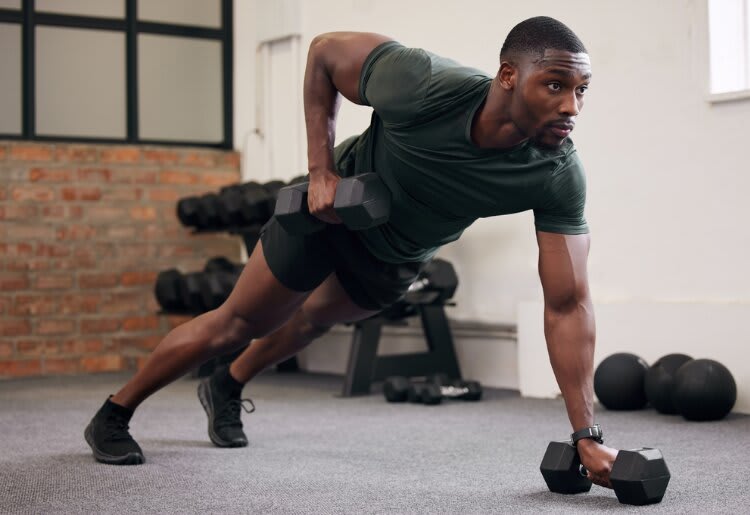DNA testing kits can do more than just trace your ancestry—they're changing the way we approach fitness and sport. By analyzing your genes, you can uncover your body's unique potential for physical activity.
The latest findings from Anglia Ruskin University are astonishing: about 72% of how we respond to exercise is hardwired in our genes. This means your DNA can guide you toward the workouts you're naturally good at. Here's how genetic testing can shape your fitness regime.
» Ready to move? Learn how at-home blood tests improve athletic performance.
Understand Your Muscle Fiber Composition
DNA testing can identify the types of muscle fibers predominant in your body, which influences how well you may perform in different sports. There are mainly two kinds of muscle fibers: fast-twitch and slow-twitch.
If you have mostly fast-twitch fibers, you're probably good at sports that need quick, powerful movements, like sprinting or weightlifting. On the other hand, if you have more slow-twitch fibers, endurance exercises like marathon running or long-distance cycling may be your forte.
The ACTN3 gene is important here. Specific variants of this gene, like the 577RR genotype, often suggest a natural talent for explosive activities.
Determine Your Risk for Sports Injuries
Recent research shows that 124 genetic variations can increase the likelihood of injuries such as Achilles tendon issues, ACL tears, or osteoarthritis. And over the past 20 years, studies have consistently indicated that small changes in our DNA can make us more prone to injuries when playing sports.
Understanding how these genetic factors influence us can guide us in developing safer training strategies to enhance our sports performance while minimizing injury risks.

Learn About the Role of Genetics in Nutrition
DNA tests can reveal how well you absorb and use nutrients, meaning genes can affect how much and what types of food are right for you. Since your genetic makeup is unique, your nutritional needs will differ from those of others.
That's where nutrigenetics and nutrigenomics come in. These emerging fields of science focus on how your genetic background influences your response to different foods. By examining your genes, you can get a better idea of what diet may work best for you.
» Are you eating the right foods? Here's what DNA tests can tell you about nutrition.
Discover How Genetics Influence Your Exercise Response
Aerobic Potential
Aerobic capacity, measured by VO2 max, indicates how much oxygen your body uses during exercise. This shows how fit your heart, lungs, and blood circulation are for aerobic activities like running or cycling.
Research reveals that genes account for approximately 44% of the variance in your aerobic performance. So, knowing your VO2 max offers insights into your natural aerobic fitness levels and how to improve them.
Response to Strength Training
According to the same study, genes matter even more in strength training activities like weightlifting, accounting for roughly 72% of the variation in workout outcomes. Scientists categorize people into three groups:
- Non-responders who don't see much change in training
- Regular responders who improve steadily
- Extreme responders who quickly show remarkable progress
These differences are tied to genetics, specifically how our bodies manage insulin, triglycerides, and blood sugar levels. Interestingly, one study even identified 13 genes that impact how effectively your body responds to exercises.

Personalize Your Weight Management With DNA Tests
Managing your weight is crucial, especially if you're an athlete. Studies show that variations in the FTO gene are linked to a higher body mass index (BMI) and health concerns like increased blood sugar, lower levels of good cholesterol, larger waist size, and more body weight.
If you carry specific versions of the FTO gene, you may need a specialized diet and workout plan to maintain a healthy weight. These regimens are more than just general advice; they're customized plans based on your DNA.
» Take control of your weight with our top DNA tests for diet and weight loss.
Boost Your Workout Motivation
The BDNF gene can significantly influence how motivated you are to exercise. Certain variants of this gene may naturally boost your drive to hit the gym or go for a run. This genetic predisposition can make it easier for you to maintain a consistent exercise routine, as your body and mind are more inclined towards staying active.
Additionally, understanding your body's natural strengths through genetic testing can help you pick activities where you'll see results sooner, keeping you excited and committed to your fitness goals.
Improve Your Heart Health
Your genetics significantly influence your heart's behavior, size, and recovery speed after exercise. These traits impact your risk for heart disease and play a significant role in how well you perform during physical activities.
Researchers are trying to identify specific genes that affect heart performance during exercise. Although this investigation is ongoing, current DNA tests can detect risk factors for heart disease and other conditions. Being aware of these dangers can help you choose exercises that keep your heart strong and healthy, especially as you age.

Embrace DNA-Driven Athletic Performance
With genetic testing, we can improve our fitness regimes by matching plans to our DNA. This could lead to better performance and fewer injuries. As research continues, these tests may help us train more effectively and understand our bodies better.
This new approach can benefit professional athletes and fitness fans, giving everyone a chance to reach their physical goals.
» Enhance your sports performance with genetically matched training.

